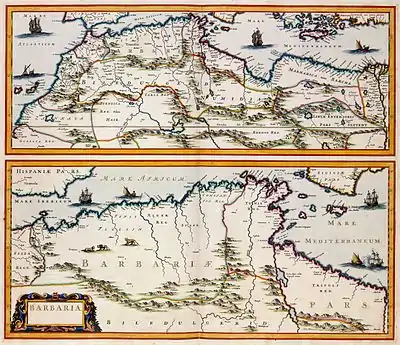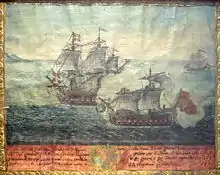Barbary Coast
The terms Barbary Coast, Barbary, Berbery or Berber Coast were used in English-language sources (similarly to equivalent terms in other languages) from the 16th century to the early 19th to refer from a Eurocentric point of view to the coastal regions of North Africa, specifically the Ottoman borderlands consisting of the regencies in Tripoli, Algiers and Tunis as well as, sometimes, Morocco.[1][2] The term was coined in reference to the Berbers.

History

Barbary was not always a unified political entity. From the 16th century onwards, it was divided into the political entities of the Regency of Algiers, Tunis, and Tripolitania (Tripoli). Major rulers and petty monarchs during the times of the Barbary States' plundering parties included the Pasha or Dey of Algiers, the Bey of Tunis and the Bey of Tripoli.[3]

The first military land action overseas by the United States, was executed by the US Marines and the US Navy at the Battle of Derna, Tripoli, a coastal town now in eastern Libya, in April 1805. It formed part of an effort to destroy all Barbary pirates, to free American slaves in captivity and end piracy acts between the warring tribes on the part of the Barbary states, which were themselves member states of the Ottoman Empire. The opening line of the Marines' Hymn refers to this action: "From the halls of Montezuma to the shores of Tripoli..." It was the first time that the US Marine Corps took part in offensive actions outside the United States.
See also
- Ottoman Algeria
- Ottoman Tripolitania
- Ottoman Tunisia
- Tunisian navy (1705-1881)
- Turkish Abductions
- Republic of Salé
- Sharifan Empire – History of human habitation in Morocco, since prehistoric times
- Langue de Barbarie
- Barbary duck
References
- Ben Rejeb, Lotfi (2012). "'The general belief of the world': Barbary as genre and discourse in Mediterranean history". European Review of History: Revue européenne d'histoire. 19 (1): 15. doi:10.1080/13507486.2012.643607.
- Hinz, Almut (2006). "Die „Seeräuberei der Barbareskenstaaten" im Lichte des europäischen und islamischen Völkerrechts". Verfassung und Recht in Übersee / Law and Politics in Africa, Asia and Latin America. 39 (1): 46. JSTOR 43239304.
- Chisholm, Hugh, ed. (1911). "Barbary Pirates" . Encyclopædia Britannica. 3 (11th ed.). Cambridge University Press. pp. 383–384.
Sources
- London, Joshua E. (2005), Victory in Tripoli: How America's War with the Barbary Pirates Established the U.S. Navy and Shaped a Nation, New Jersey: John Wiley & Sons, Inc., ISBN 0-471-44415-4
- LAFI (Nora), Une ville du Maghreb entre ancien régime et réformes ottomanes. Genèse des institutions municipales à Tripoli de Barbarie (1795–1911), Paris: L'Harmattan, 2002, p. 305
External links
| Look up Barbary Coast in Wiktionary, the free dictionary. |
- "When Europeans Were Slaves: Research Suggests White Slavery Was Much More Common Than Previously Believed", Ohio State University
| |||||||||||||||||||||||||||||||||||||||||||||||||||||||||||||||||||||||||||||||||||||||||||||||||||||||||||||||||||||||||||||||||||||||||||||||||||||||||
| |||||||||||||
| |||||||||||||
| |||||||||||||
| |||||||||||||
| |||||||||||||
